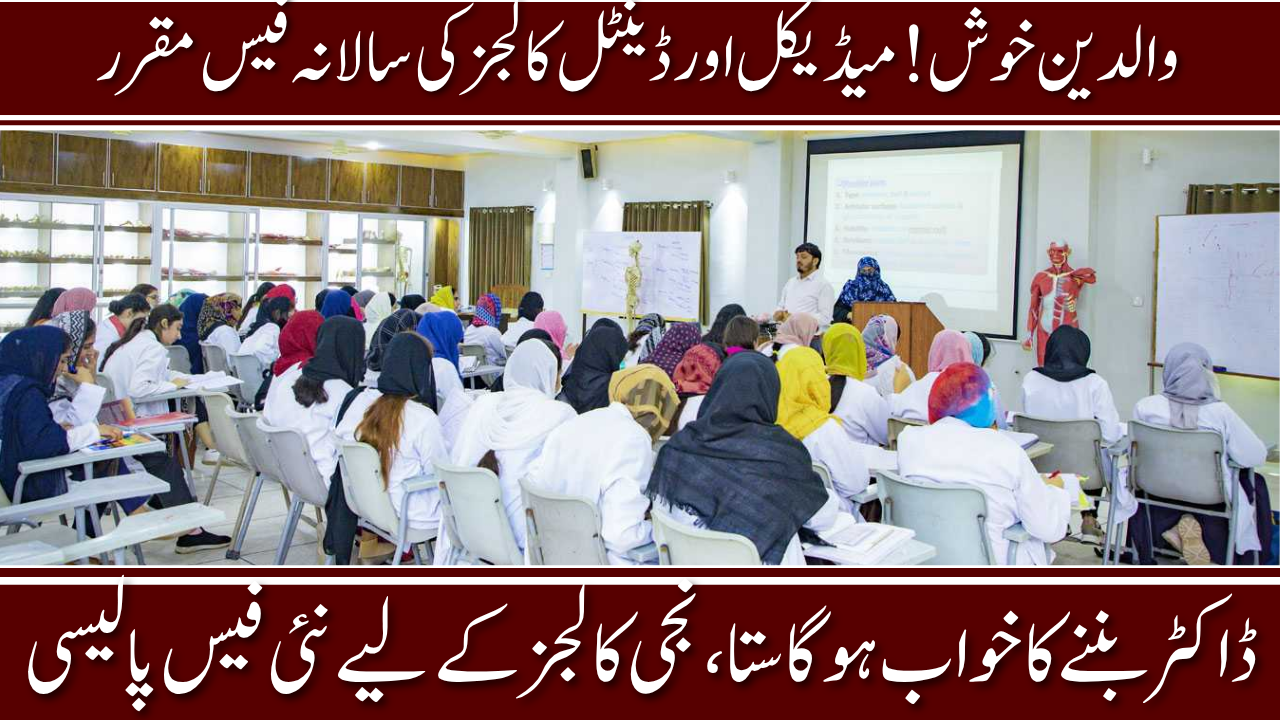Tuition Fee for Medical and Dental Colleges
The Pakistan Medical and Dental Council (PMDC) has issued a new notification regarding the maximum annual tuition fee for medical and dental colleges across the country. This announcement has been welcomed by students, parents, and education experts who had long been calling for a more transparent and regulated fee structure in private sector institutions.
Why the PMDC Fee Announcement Matters
For years, aspiring doctors and dentists in Pakistan faced an uphill battle not only in gaining admission to top medical and dental colleges but also in managing the ever-rising tuition fees. Parents often complained that private colleges charged exorbitant amounts, creating a financial burden on middle-class families.
The new PMDC policy directly addresses these concerns by putting a cap on what institutions can charge annually. This move is being seen as a step towards fairness, accessibility, and quality assurance in medical education.
Key Features of the New Tuition Fee Policy
According to the latest directives, the PMDC has finalized the maximum annual tuition fee for both medical and dental colleges. Below are the details:
| Discipline | Maximum Annual Tuition Fee (PKR) | Additional Charges (Hostel, Transport, etc.) | Remarks |
|---|---|---|---|
| MBBS (Medical) | Rs. 1,050,000 | Allowed but must be reasonable and pre-declared | Includes tuition, labs, library, and exam fees |
| BDS (Dental) | Rs. 950,000 | Same as above | Institutions must not charge hidden fees |
| Foreign/Overseas Students | USD 20,000 | As per policy | Strict monitoring for compliance |
The PMDC has made it clear that no college is allowed to exceed this cap. Any violation will lead to penalties, including fines, cancellation of registration, or even withdrawal of recognition.

Ensuring Transparency and Accountability
One of the most important aspects of this notification is the emphasis on transparency. PMDC has directed all medical and dental colleges to display their fee structures publicly on their notice boards and official platforms. Furthermore, colleges must submit an audited report annually to prove compliance with the set tuition fee guidelines.
This ensures that students and their families will not face unexpected financial shocks after admission.
Impact on Students and Families
The new policy is expected to ease the financial burden on thousands of families across Pakistan. By placing a ceiling on annual tuition fees, the PMDC is making professional education more inclusive for students belonging to middle-income groups.
Parents who previously feared being overcharged can now send their children to private institutions with greater confidence. This move may also reduce the trend of students seeking education abroad due to cost issues, as local medical education will become more affordable and standardized.
Reaction from Medical Colleges
While students and parents have praised the announcement, some private colleges have expressed concerns. Administrators argue that running quality institutions with state-of-the-art labs, faculty salaries, and modern facilities requires significant investment. However, the PMDC has assured that the set tuition fee is sufficient to cover all legitimate expenses while preventing exploitation.
The council has also stated that colleges are free to generate additional revenue through research projects, international collaborations, and partnerships rather than placing the burden on students.
A Step Towards Merit and Equality
This decision also indirectly strengthens merit-based admissions. With reduced financial disparities, talented students from diverse backgrounds will be able to pursue careers in medicine and dentistry without being held back by affordability issues.
Moreover, the move is expected to discourage corruption and illegal practices in the admission process, such as under-the-table payments and unrecorded “donations.”

PMDC’s Monitoring Mechanism
To ensure the policy is fully implemented, the PMDC has announced a strict monitoring system. Surprise inspections, random audits, and student complaint portals will help track any violations. Colleges found guilty of overcharging students may face strict disciplinary action, including fines of up to Rs. 10 million.
Conclusion
The PMDC’s announcement of the maximum annual tuition fee for medical and dental colleges is a landmark step in regulating Pakistan’s healthcare education system. By creating a balance between affordability for students and sustainability for institutions, this policy ensures that aspiring doctors and dentists can focus on their studies without being crushed by financial pressure.
It is now the responsibility of both students and parents to stay vigilant and report any violations, and for medical colleges to comply with the rules in letter and spirit. If implemented effectively, this reform could pave the way for a fair, transparent, and accessible medical education system in Pakistan.
Related Posts













